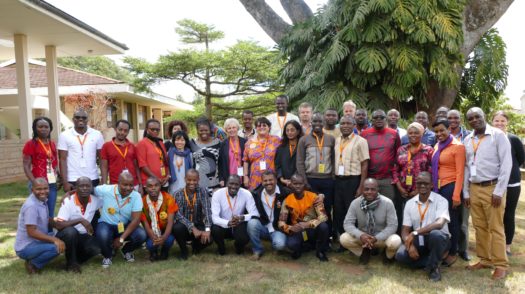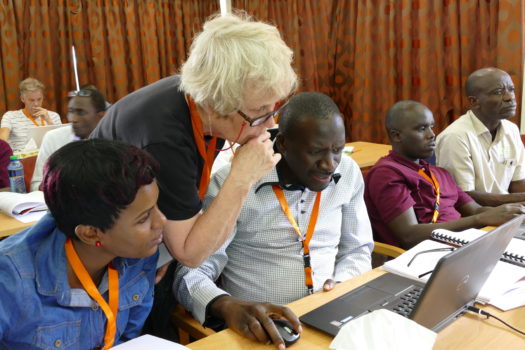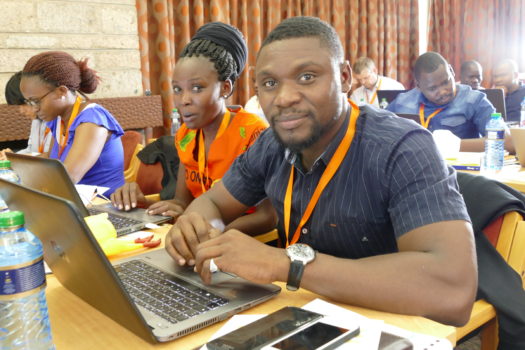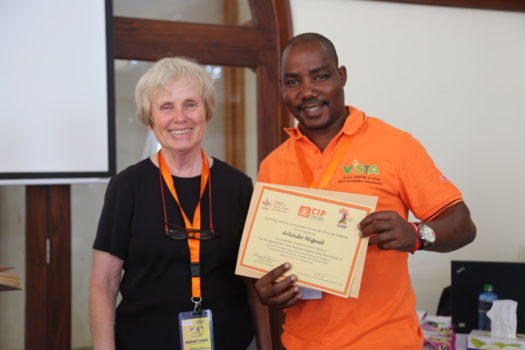CIP and its partners has, since 2015, embarked on efforts to harmonize the collection and analysis of M&E data. In January 2017, the Monitoring, Learning, and Evaluation Community of Practice (MLE CoP) launched a Manual for collecting key monitoring data, along with Stata programs for analysing such data. Consequently, a six-day training course on “Data Management and Cross-Sectional Analysis Using Stata” was held in Kenya’s capital city of Nairobi to encourage the use of Stata. The training, which kicked off on the 13th of February 2018 and attended by 38 participants, was designed to cover both data/file organization and actual data analysis both at intermediate and advanced levels. Margaret Beaver, an excellent and experienced Stata trainer who spent most of her career at Michigan State University, was the lead trainer for the course.

For most of the CIP and partner M&E staff, management of data and, especially the analysis of collected data to extract the information required to report progress on key project indicators, has been ad hoc. Majority have been using different software in the past to manage data and conduct statistical analysis. The training was convened to was intended to encourage the use of same software in data management and analysis across projects and partners. Stata has the advantage of being cheaper than the often-used SPSS software, having a perpetual licensing plan, and, most importantly, very good in the analysis of social science data.
This training course, unlike many such trainings, was not a lecture-based course, but rather a semi-structured hands-on workshop in which trainees practically, incrementally and systematically learned how to use Stata to store data collected from the field, clean them, and analyse them; and also document all steps in data cleaning and analysis. The last activity is essential in allowing future users to understand the data and analysis.

The active participation of the trainees was aimed at maximizing the benefits of the training. To enhance interactive learning, Margaret was backstopped by assistant trainers namely, Srini Rajendran, Temesgen Bocher, Abdul Naico, Norman Kwikiriza and Jan Low.
For Netsayi Mudege, a Gender Research Coordinator with International Potato Centre, the training could not come at a better time. “Over the past two years, we have collected a lot of research data in different areas which we have not been able to analyse effectively. This training will help me do that and generate good reports,” she said. She further added, “a few years back I attended a Stata training, but I did not gain anything from it; but this time, thanks to Margaret’s technique of training, I have learnt a lot…. her study packs are also easy to follow and I would recommend this training and her as the lead any day. This training is the best thing to happen to me ever since joining CIP.”

Another participant, Ibrahim Koara, Program Support Officer at iDE in Burkina Faso, on the other hand, said “In proposal development, we always need data to support what we are doing and also donors are evidence-based so we constantly have to provide clean data, so this training is important.”

Even before the end of the training, Lonjezo Maskini, an M&E Specialist with CIP in Malawi, and a new Stata user commented, “I came to this training with DVM data I had collected, without knowing how to analyse it. I am so happy that I have now started the analysis the data.”
Some of the participants who had used Stata found the training a good refresher for them in areas they were uncertain of. One of them, Temesgen Bocher, who is good in Stata programming remarked, “I have learned several new things in this training that will make me more efficient in using Stata.”
At the end of the training, participants received certificates of completion presented by Margaret Beaver and Julius Okello. An on-line evaluation of the course by participants reported that 61% rated the quality of the overall training as very good; 39% as good. A great success, but the proof will come as we monitoring to see how usage of Stata increases by members of the MLE CoP in 2018.

The training was sponsored by the Roots, Tubers, and Banana (RTB) CGIAR Research Program through CIP’s Social and Nutrition Sciences Division and the Sweetpotato Action for Security and Health in Africa (SASHA) Project and organized by Julius Okello, Jan Low and Srini Ranjendran.
3 Comments. Leave new
I seriously need training in STATA. Where can I get this training in Nairobi, Kenya
Talk to us please. Call 0740920103 for STATA Training
Hi
Please quote for the below for 5 users of each and the availability
1: Stata software
2 : R Software
3 : NVIVO Software
4 : Atlas TI software